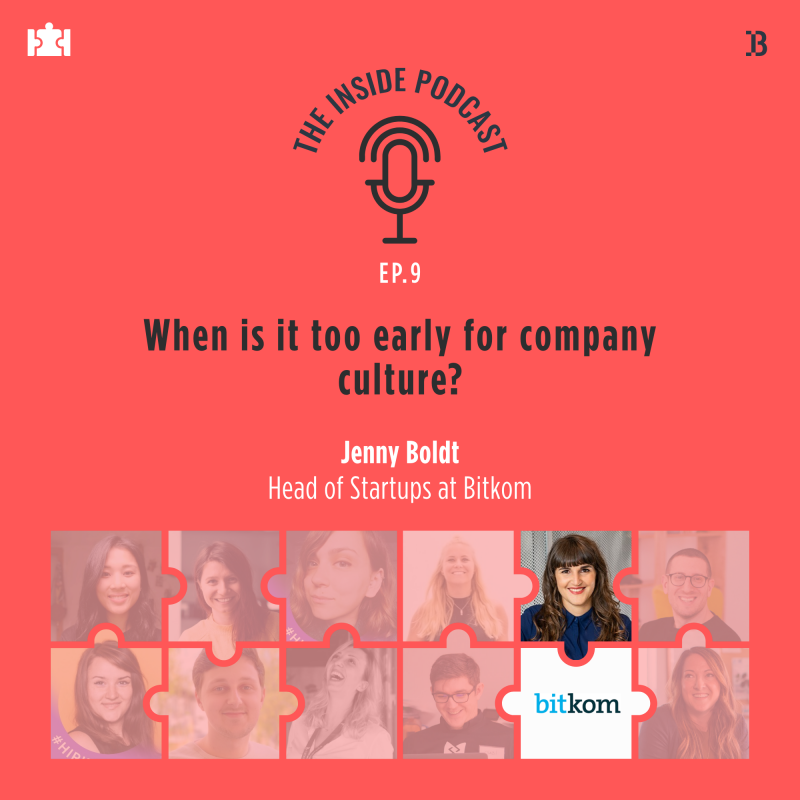Overview – Defining company culture
When should startups define their company culture? In Ep. 9 of The Inside Podcast, you’ll be listening to Jenny Boldt, Head of Startups at Bitkom. Jenny has shared with us her personal take on building a company culture. Tune in to learn more about what makes a startup successful.
What you’ll learn by listening
- Why letting people that don’t fit the company culture go is the best (but hardest) decision founders should take
- Three most common mistakes startups do when it comes to company culture
- Three examples of companies that are doing an amazing job at building a strong company culture
- What makes a successful startup: team or product?
- Insightful tips to a healthy company culture
About the company
Bitkom is Germany’s digital association. Founded in 1999 in Berlin, Bitkom represents more than 2,700 companies of the digital economy, and its membership spans more than 1,000 SMEs, over 500 startups, and virtually all global players. Bitkom advocates the digitization of the economy, society, and public administration. The association pushes for the faster rollout of gigabit networks and digital infrastructure for energy and mobility, for trade and for smart homes, for cities and regions. A strong European digital policy and a fully integrated digital single market are at the heart of Bitkom’s concerns, as well as establishing Germany as a key driver of digital change in Europe and globally.
Enjoy listening to Ep.9 of The Inside Podcast on Spotify!
Podcast transcription – When is it too early for company culture? with Jenny Boldt @Bitkom
Georgiana: Hi, everyone! This is Georgiana and you’re listening to The Inside Podcast where people from various companies share their insights into what it’s like to be a tech talent manager, a recruiter, or an employer branding manager. Our topic for today is company culture. And I’m hoping to bring some more light to this topic in a more concrete way while speaking to Jenny Boldt, Head of Startups at Bitkom. Welcome, Jenny! Good to see you today and to hear you. Please tell us in a few words what does Bitkom do exactly? And what does your role with them entail?
Jenny Boldt: Bitkom is the largest digital association in Germany. We lobby for the interests of digital companies and we have over 2000 members in the digital ecosystem. I work with my startup team for our startup initiative called “To get started”. We look out for the best interest of our startups via matchmaking where we bring together startups and match them with corporate companies and investors. I really try to bring the spirit of founding in education, create a bit of a mindset shift, and compel more people to choose their own way of funding a company.
Georgiana: I imagine, as you said, that you are working a lot with startups. And since our topic for today is company culture, I think values are also an important point to discuss. I was thinking, and actually, I have always been wondering, when is it too early for a startup to discuss values? Do they discuss it in the beginning? Do you discuss them after you’ve made your first hire? Before that? How does it work in your opinion?
Jenny Boldt: I think it depends. I also founded a startup over three years ago. So, of course, with my two co-founders, we were discussing a bit in the beginning. Along the way you get to know your co-founders quite well. You may have some values that you agree on regarding how you want to build and manage your company. But of course, in the beginning, you don’t have the time to actually write down all the values and everything that you want to add to create the perfect organizational structure.
There’s always a good lack of time for that in the beginning. But I think it’s okay as long as you don’t leave it on the site for the whole time. It’s all about finding the right moment. It may not seem easy to put together ideas and develop strong values in the beginning. But it pays to have some structure or, at the very least, define a direction where you want to have your organization developed.
Georgiana: What would you say are the three most common mistakes that you’ve seen startups do when it comes to company culture? Maybe as they were starting out or later in their development?
Jenny Boldt: Some may recognize a bit too late that they need to hire someone for HR and that’s because HR may not seem to be directly relevant to their core business. This way, the organizational part develops on its own/on the side/on the go, meaning that they cannot really control it and set it the right direction. Later on, it might become more difficult to change the organizational development part. Some of the founders told me that it’s wiser to hire a person with a great entrepreneurial mindset and the right team spirit that fits into your team perfectly but may not be meeting all the requirements of the job profile.
Because I think when you hire the wrong person, that can kill the whole team atmosphere and can demotivate everyone. And if you did that and you hired the wrong person – even though I think it’s really, really hard, and probably always the hardest thing for a founder to do – you may need to let that person go before it becomes the reason for other people to leave. I had one founder and she told me that she was really struggling with the development and the team. It was a really hard decision for her, but in the end, she decided to let three people go. It was the darkest day of her life but afterwards she said it was definitely the right decision. They managed to develop a much better team atmosphere and everyone was motivated again.
Georgiana: For me personally, I can confirm that letting someone go from the team is one of the hardest things I’ve ever had to do besides having a baby. So I can absolutely confirm. And I think most times it’s just like in a regular relationship. The person you let go might be better off somewhere else. So yeah, why let them stay in the team that isn’t responding to what they really want to do or be in life?
Jenny Boldt: Yeah, definitely. But it’s hard, of course.
Georgiana: Okay. Would you tell me what you think are three businesses that you think are doing a great job when it comes to building a strong company culture? In Germany or elsewhere?
Jenny Boldt: I think you already had Cassandra in your podcast. So Personio is one of those companies that I believe are doing a great job at building a strong company culture. They’re doing quite a lot regarding company culture, support for the employees and everything. Their Kununu scores are really high. I think 4.4, so 90% recommend Personio. I really think they’re doing a great job. A big shout out to Cassandra.
I think the same score has raised Raisin. I also heard really positive things about the company culture there. And a third one, I would point out Ratepay because Miriam, I think is the founder and CEO. They have a really low fluctuation of employees, which is probably a sign that most employees are quite happy.
Georgiana: I agree. And now more of a technical question. Team or product for a successful startup? Another very common dilemma.
Jenny Boldt: I would always say team, but both are great. I think a product you can change, you can pivot, you can revise. In the startup journey, you always need to maybe redefine, change, pivot your product. But in this case, you don’t change your team so much and I think a really great team can build a great product anyway. If I had to decide I would go for the team.
Georgiana: I think I would choose the same. The right combination of roles and people, and the right company and team vibe can get to solve problems that are very, very unsolvable. They can come up with ideas for products that are really important.
Jenny Boldt: Yeah, definitely. There are also some startup accelerator programs looking for great entrepreneurs, even without any idea yet. And then they fund them and give them time to develop an idea and to create a product. So they don’t go there with a product or an MVP or something. Some investors are really looking for the team. They’re really looking for the right people. Then you will probably start a successful startup or develop a great product.
Georgiana: And since we’re discussing this, something just popped into my mind right now. Is it better to have a co-founder, or to just be on your own? What has your experience been so far, personally and professionally?
Jenny Boldt: I think it’s better to found a company with a team. But that’s just my personal opinion. I think you have different strengths and weaknesses, and you have different talents. If you have the right team, where you can combine different kinds of talents, then you’re better off. It’s a really hard journey, with ups and downs and everything. With our team, it’s always good that maybe if someone has some doubts or whatever, and the other one is really motivated, you can always motivate each other and work together and discuss hard decisions. I would always prefer founding a company with at least one or two co-founders.
Georgiana: Okay, three tips to a healthy company culture. What would you say?
Jenny Boldt: Well, coming back to the beginning with values. I think that in a startup you need to have or you need to show appreciation. Everyone works a lot, is fully committed, puts their heart and soul into it, and works probably more than expected in a normal job. It’s very important to appreciate this above average commitment that everyone is putting. I think that’s really important. Then also, maybe transparency and open communication so that you know what’s going on, deal with investors or the numbers. And everyone knows where the company stands and whether or not the co-founders are happy at a given moment in time because of various reasons like really hard negotiations or something.
Georgiana: Or even personally. Things can sometimes be challenging.
Jenny Boldt: Transparency and open communication are really important. Going in the right and same direction, but also trust matter just as much. Not micromanaging and rather trusting everyone that they will do their job, and helping them do their job, of course, is important. It matters to give people the benefit of the doubt.
Georgiana: Okay. Great. Do you have a book that you liked recently and that you found inspiring?
Jenny Boldt: I think someone already cited it on LinkedIn. It’s called Keinhorn. It’s in German but it’s about what it really means to found a startup; kind of like saying “a unicorn without a corn”. Overall, I think it’s a really interesting and entertaining journey through the startup scene with some good learnings for everyone. Although the authors are very honest about many difficulties and problems, it made me want to start my own startup again. I think it’s quite an inspiring book, even though it’s really honest.
Georgiana: Would you say it’s easily written? Could someone who’s not entirely fluent in German read that book? Or is it maybe too advanced?
Jenny Boldt: I think you can. It’s hard to say, but I mean, it probably helps to learn German.
Georgiana: I am learning, but some of the books are really still too difficult. But I will try it. I’ll try it and let you know how it goes. Okay, and to end our discussion, which has been very pleasant in a rather funny way. I’d like to ask you about the funniest or most awkward moment in your career so far.
Jenny Boldt: I would say that during my time as a founder, one day I had a film team from Deutsche Welle. They accompanied me the whole day. And we went to the farmers market, and I was supposed to look around, so they can get some nice shots, whatever. And then I had to go to this cheese stand and talk to the seller. And the filmmaker asked me to try something. The seller gave me this piece of very, very strong goat cheese. And I’m not a fan of goat cheese. I couldn’t say at that moment, so I had to taste that strong goat cheese and really try to look into the camera that I liked. Had to make it appear super tasty. That was a bit of a weird moment. And to have a film crew follow you around the farmers market. Everyone was making me seem really important and people were standing and watching and seeing what I do. And yeah, so that was a nice experience, but also a bit weird.
Georgiana: Okay, thank you so much, Jenny for being with us today. I hope to meet you in person once these restrictions are done. I wish you good luck in your role at Bitkom. Talk soon.
Jenny Boldt: Thank you very much and good luck.
You can find our podcast on Spotify and Apple Music. And if you want to read more on employer branding or digital marketing content in general, go to beaglecat.com or employerbranding.tech. See you next time!






